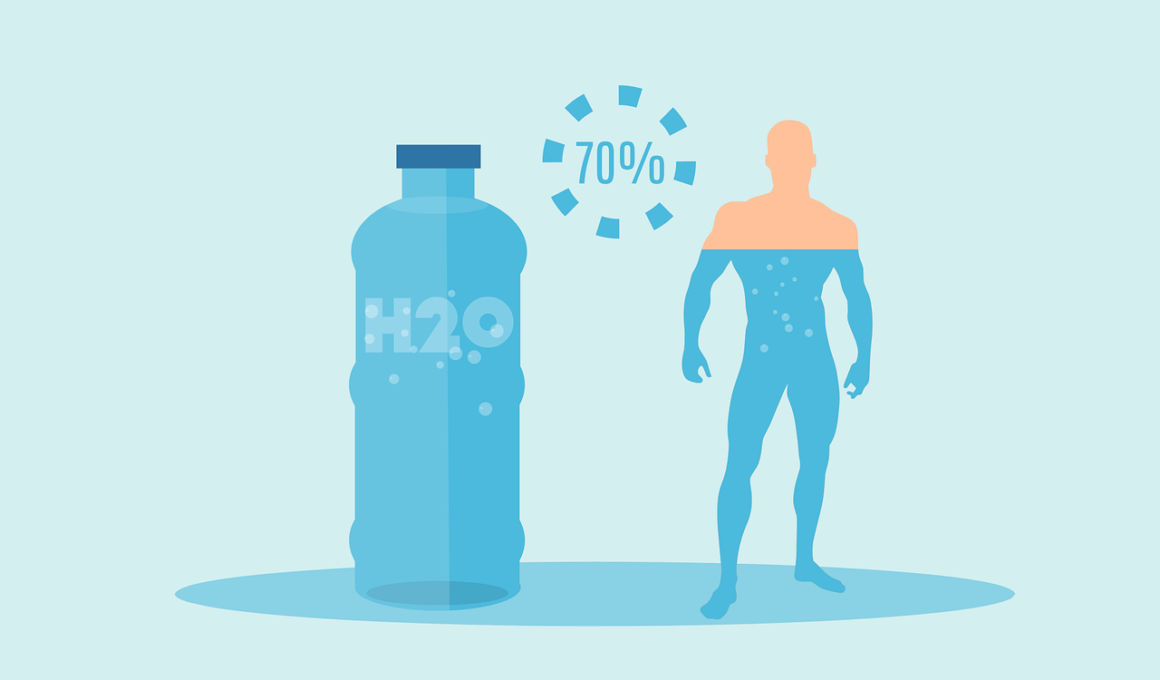Hydration and Its Impact on Core Training Performance
Hydration plays a crucial role in core training, significantly influencing performance and efficiency. When you engage in core workouts, your body loses water through sweat. This process can lead to dehydration, which negatively impacts muscle function, endurance, and overall performance. Drinking adequate fluids before, during, and after workouts is vital for maintaining optimal hydration levels. Water assists various bodily functions, such as nutrient transport, temperature regulation, and joint lubrication. Ensuring proper hydration can enhance recovery and reduce the chances of injury, making it essential for anyone focused on core training. Additionally, incorporating foods with high water content into your diet, such as fruits and vegetables, can support your hydration efforts. Beyond just water, electrolyte balance plays a significant role in staying hydrated and optimizing muscle performance. Electrolytes, such as sodium and potassium, help retain water and support muscular contractions, which are critical for core exercises. A well-rounded hydration approach can improve the overall efficacy of your training regimen, increasing your core strength and stability in the long run. Therefore, make hydration a top priority before embarking on your next core training intensive session.
In terms of hydration, timing is key to optimal core training performance. It is recommended to start hydrating well in advance of your training session, as this allows your body to acclimate and maintain performance levels. Aim to drink at least 16 to 20 ounces of water two to three hours before exercising. During the workout, continue sipping on water to replace fluids lost through sweat, which can improve endurance and maintain strength. Furthermore, for longer training sessions exceeding an hour, consider incorporating a sports drink that contains electrolytes. This can replenish both fluid and essential minerals. Always remember to hydrate after workouts, as this aids in recovery and reduces fatigue significantly. The focus on post-workout hydration cannot be overstated; it helps restore any fluid loss and supports muscle repair processes. Experimenting with different hydration strategies is essential, as individual needs can vary based on factors like climate and workout intensity. The goal is to listen to your body and replenish fluids accordingly, ensuring peak performance during core training routines while minimizing the risk of dehydration-related issues.
Understanding the Signs of Dehydration
Being aware of the signs of dehydration is crucial for anyone involved in core training. Symptoms can manifest in various ways, including fatigue, dizziness, and decreased energy levels, all of which can impair your workout results. Additionally, you may experience a dry mouth or mild headaches, which can be easily mistaken for general tiredness. As core exercises often require concentration and stamina, it’s important to recognize these signs early. Thirst is usually the initial indicator of dehydration; however, it may not always be the most reliable guide. Instead, keep track of your urine color; a pale yellow indicates adequate hydration, while dark urine suggests that you need to drink more fluids. Moreover, muscle cramps can also signal dehydration, particularly during intense core workouts. Ensuring you stay well-hydrated can prevent these unpleasant experiences and maintain peak performance. Developing a routine that includes hydration checkpoints during your training sessions can help you stay on top of your hydration status. Ultimately, understanding and recognizing the signs of dehydration can lead to improved performance and a more enjoyable training experience.
Nutrition also plays an important role in hydration and performance during core training. Foods with high water content can contribute to your overall fluid intake, further enhancing your hydration efforts. Fruits like watermelon, oranges, and strawberries, alongside vegetables such as cucumbers and lettuce, offer vital hydration along with essential nutrients that support muscle function. Consuming these foods as part of your pre- and post-workout meals can optimize your energy levels. Moreover, incorporating foods rich in electrolytes, such as bananas, avocados, and Greek yogurt, can also significantly improve your hydration and recovery processes. Because electrolyte balance is key for muscle contraction and preventing cramps, these foods will enhance your core performance. Understanding the relationship between nutrition and hydration helps create a tailored approach toward your core training goals. Regular meal and snack planning can ensure you have an optimal blend of hydration and energy sources while training your core. By focusing on nutrition, you not only stay hydrated but also support sustained core strength through well-rounded dietary choices.
The Effect of Dehydration on Performance
Research shows that even mild dehydration can detrimentally affect physical performance, particularly during core training. Studies indicate that losing as little as 2% of body weight due to dehydration can lead to decreased strength, stamina, and cognitive function, which are essential during strenuous workouts. Athletes engaging in core exercises may find that their ability to maintain proper alignment and engage their muscles is hampered when they are dehydrated. Core workouts often demand a high level of focus and energy, and dehydration compromises both. Moreover, dehydration can decrease endurance levels, making workouts feel more challenging and less effective. The psychological effects of dehydration can also come into play, as fatigue sets in and motivation wanes. To combat these effects, it’s essential to develop a hydration plan tailored to your core training regimen. By regularly monitoring your hydration status and adjusting as needed, you can tackle the risks posed by inadequate fluid intake, enabling you to maximize performance. A strategic approach will help ensure you remain energized and focused, allowing your core training sessions to be productive and rewarding.
To further support effective hydration strategies during core training, consider keeping a hydration log. This can be a simple method to track your fluid intake before, during, and after workouts, along with any changes you observe in performance. By identifying patterns and correlating hydration levels with your energy during core workouts, you can fine-tune your hydration routines. Another practical approach involves setting reminders to drink water throughout the day, especially when training intensifies. Hydration can often take a backseat to increasing workout intensity, so staying mindful is key. Aim to incorporate breaks during your sessions for water intake, which helps cultivate a habit of hydration over time. Additionally, explore the use of hydration apps that can send you alerts to drink water regularly throughout the day. Take time to experiment with various hydration options to find what works best for you, as everyone’s needs can be different depending on factors like individual sweat rates and workout intensity. Ultimately, these strategies will improve your core training focus and performance as a whole.
Final Thoughts on Hydration and Core Training
In conclusion, hydration plays a fundamental role in improving core training performance. The balance of fluids in your body is crucial for effective training, recovery, and overall health. Adapting strategies for maintaining hydration before, during, and after workouts will contribute markedly to your core strength goals. Remember that hydration is not merely about drinking water; it also includes consuming water-rich foods and electrolytes that optimize fluid retention. Pay attention to the signs of dehydration, and be proactive in adjusting your intake based on workout conditions and intensity. Developing a hydration routine tailored to your needs will ensure you’re better prepared to meet the demands of core training. When you maintain adequate hydration, you create a solid foundation for improved performance levels. The intensified focus on hydration, paired with nutrition, reinforces the potential for successful core workouts. As you implement these strategies, you may notice enhanced performance, increased energy, improved concentration, and reduced injury risk. Prioritize hydration in your core training regimen, and reap the benefits of your dedication throughout your fitness journey.
By embracing a comprehensive hydration approach, you can experience the full benefits of your core training sessions. Whether you are an athlete or a fitness enthusiast, making hydration a central component of your regimen will lead to improved performance and results. Don’t underestimate the importance of water and nutrition; they are fundamental to reaching your fitness goals. Consistent efforts to monitor your fluid intake will empower you to reach and maintain peak performance, all while enjoying the process of training your core.


